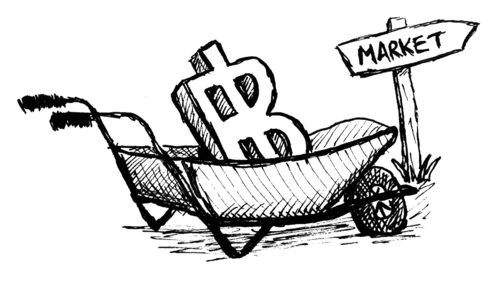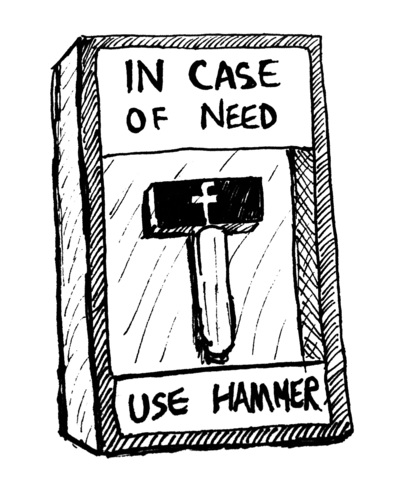Two years ago I sold exactly One Bitcoin at a newly installed Bitcoin ATM in Mountain View. There was some excitement: This was the first day of operation for Silicon Valley’s first Bitcoin ATM, I was the first person to sell a coin and the owner was sitting anxiously to see how his newly acquired contraption worked out. A local TV crew had just rolled up. The high spirits were only tempered by the BTC price tumbling from $1,200 over the prior two months.
I flew to Europe the next day and put my $500 proceeds in a box. I forgot all about it until last week, when I grabbed it on my way to the airport bound for Miami. I just bought a coffee with the last banknote from this little haul, and it got me thinking about what’s happened in Bitcoin over the past two years from the perspective of a mildly interested outsider. (I still hold a small amount of Bitcoin.)
I should say that although I understand the basic concepts behind Bitcoin, I don’t spend any time following the community or really diving into the technology. So this article isn’t an attempt at a technical guide - it’s more a summary of what has stuck in my mind from the previous two years. I don’t write it with any real objective other than being able to look back at it in another two years.
The Bitcoin ATM I used was removed and the company that made it stopped production. Robocoin, which made the machine that I used, received a lot of criticism over its service and products, and stopped manufacturing the ATMs. The process of me selling a bitcoin took around 30 minutes. I had to scan my face, my palm, and my passport, and then wait for all these to be processed. It was the least anonymous transaction I’ve ever done. This ATM was removed around 8 months ago and since then I’ve not seen any other machines where you can sell bitcoins for cash, but I have seen many where you can buy bitcoins.
The price of bitcoin dropped, recovered a bit and then stablized. From its December 2013 peak of $1,100, the price spent just over a year falling, bottoming at $200 in January 2015. From there it’s been a year of slow, but reasonably steady, rises to today’s price of $426.
The volume of transactions might risen have reasonably steadily. I’m not sure how much trust can be put in figures like these because an increasing number of transactions probably occur off the blockchain at exchanges like Coinbase.
Mt. Gox collapsed taking $450million and remains still unsolved. In February 2014, as I was scanning my hand at the Robocoin kiosk, Mt. Gox was in the midst of collapsing. Around $450million of Bitcoin went missing - and is still unrecovered. The CEO, Mark Karpeles, time has been charged with embezzlement in relation to using $2.6million of company funds for his own personal projects. The media seems to be largely disinterested now, although the liquidation process of Mt. Gox continues. I can’t find any information on whether Mark Karpeles is in jail, on bail, or acquitted. From the technical analysis I saw it did seem he was strongly suspected of having taken the money.
Ross Ulbricht was sentenced to life without parole for running Silk Road. Many other dark markets have sprung up to replace it, but none have the public notoriety/branding that Silk Road enjoyed at its peak. Two years ago Ulbricht’s $80m Silk Road fortune must have looked tempting to any would be marketeers - not so much today (within the reach of the US legal system in any case.)
CryptoLocker brought ransomware into the mainstream, and was closed down. Early 2014 saw mainstream media coverage of a computer virus which encrypted victims hard drives and then demanded payment of a ransom in Bitcoin for recovery of the user’s data. It seemed a runaway train at the time with estimates of $30million in proceeeds before globally co-ordinated action seized its command infrastructure. Clones of Cryptolocker targeting computers and phones have continue to appear since that time. Bitcoin is remains the currency of choice for payments.
Bitcoin killers have failed to kill Bitcoin. Alternative currencies which have spun up to tackle some of the perceived shortcomings in Bitcoin haven’t really gained much traction, although some have accrued high market caps. My feeling is that much of this is made up of people diversifying their Bitcoin holdings in the hope of another 1000x return like Bitcoin saw in its earliest days.
There is some kerfuffle about the size of the blockchain. I don’t really fully understand this situation but Bitcoin is going to hit a limit on transactions and there are two competing camps of developers for how to solve it. This is apparently going to result in the Bitcoin protocol being changed, but last I heard it was nothing to worry about and the hubbub has died down. I’m not sure this is because it’s solved, was never an issue, or no-one cares.
Satoshi Nakamoto remains totally unidentified. A bumbling Newsweek article outed retired programmer Dorian Nakamoto, who turned out to have absolutely nothing to do with Bitcoin. More recently Wired has embarrassed itself with the article “Bitcoin’s Creator Satoshi Nakamoto Is Probably This Unknown Australian Genius” wherein they identified Colin Wright, an Australian ‘businessman’. Mr Wright’s background turned out to be largely self-fabricated bullshit, probably with the aim of securing some sort of tax rebate on investment in a (probably) fictional supercomputer. Other than that, we’re no further along in knowing who created Bitcoin than we were two years ago.
Stripe started accepting Bitcoin payments. This was actually quite exciting for me. I enabled it on How a Car Works but then Stripe changed their rules and I could only accept Bitcoin if I had a US bank account, which I don’t. So I went back to credit or debit card only. I can only assume it’s a tiny, tiny part of Stripe’s business because if it was in any way meaningful I would expect some announcement of number of transactions, or attempt to scale it out beyond the US. Neither has happened to my knowledge.
Mainstream adoption has stagnated. I don’t see usage of Bitcoin increasing at any level at the moment. Buying and selling Bitcoin for fiat currency remains an absolutely enormous pain in the ass. I think this stagnation is because many of the proposed advantages of Bitcoin are just not being borne out:
- Buying and selling Bitcoin is far from anonymous. Any exchange requires a copy of your ID and linking to your bank account or debit card.
- Transacting in Bitcoin is quite trackable.
- Fees to exchange fiat currency are higher than credit cards, and money transfer services like Western Union. The ID requirements are more onerous.
- It’s future is unclear so as store of value it has significant risks.
- The promise of the underlying Blockchain is an even more complicated concept than that of Bitcoin itself. I can’t even get my head around what many businesses in this space are doing.
- The novelty and excitement have worn off. I feel like the evangelists are basically done.
I’m not sure where this even leaves us. Now that the world has tasted a decentralized, digital currency there is always going to be a demand for one - whether it’s Bitcoin or something else doesn’t really matter. I traded some BTC for Ethereum a few weeks ago in case it turns out to be huge. I’ll probably some Monero for the same reason. I’ve no idea of the practical uses of either - I’ll just be speculating because it’s easier to do that than the sell my remaining BTC for fiat.
On the other hand, Bitcoin is the undisputed gold standard of the digital currency world. New entrants are valued with reference to Bitcoin, and they have an easier launch because they can be acquired using bitcoin without the need for complex fiat exchange gateways.
And over the past four months the BTC price has remained fairly stable.
But I’ll stick to something I tweeted quite a while back, and note that in the past few months there’s been renewed interest in giant airships.


